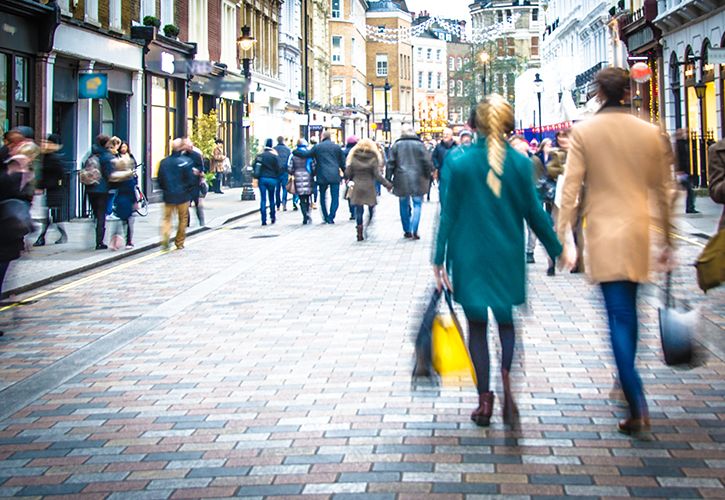UK DIY News
Barclaycard: 12.2% Growth In Consumer Spending In December

- Spending on essential items grew 13.7 per cent, boosted by supermarket shopping and fuel spend
- Yet some sectors, including clothing and department stores, saw slower growth due to concerns around the rise of Covid-19
- The hospitality sector also took a hit as festive gatherings were cancelled, and more Brits isolated or chose to stay at home
- The wider economic picture is encouraging more cautious discretionary spending, as 43 per cent of Brits expect rising inflation to affect their household budgeting
- The Barclaycard report combines hundreds of millions of customer transactions with consumer research to provide an in-depth view of UK spending
Consumer card spending increased 12.2 per cent in December compared to the same period in 2019, as Brits finished their final preparations for Christmas. However, the impact of restrictions and fears over the Omicron variant began to take effect across the retail, hospitality and leisure sectors.
Data from Barclaycard, which sees nearly half of the nation’s credit and debit card transactions, reveals that spending on essential items grew 13.7 per cent, largely driven by a 13.9 per cent rise in supermarket shopping, as consumers stocked up on festive food and drink.
Fuel spend also rose by 11.8 per cent, compared to 8.5 per cent in November – driven by rising fuel prices and many travelling to see friends and family over the festive period.
Spending on non-essential items increased at a slower rate of 11.5 per cent in December, compared to November’s 18.3 per cent growth. This is perhaps due to Brits beginning their Christmas shopping earlier in the year, as well as some shoppers opting to avoid the high-street due to concerns around the spread of Omicron.
Clothing saw noticeably smaller growth (8.8 per cent) than November (13.4 per cent), as cancelled Christmas parties and social events meant shoppers cut back their spending on new outfits. Department stores were also affected, experiencing a -7.1 per cent decline when compared to 2019.
Yet, inevitably it was hospitality and leisure sectors that were among the hardest hit as a result of new restrictions. Spending at restaurants saw a sharper decline of -14.1 per cent, compared to -3.5 per cent in November, while bars, pubs and clubs saw noticeably smaller growth of 21.2 per cent compared to 35.0 per cent the previous month.
Entertainment saw a sizeable month-on-month decrease, rising just 0.7 per cent in December compared to 22.8 per cent in November. However, among 16-24-year-olds, spending in this category grew 23.3 per cent, as younger consumers visited festive attractions, such as Christmas markets and fairs.
Travel had a challenging month, with hotels, resorts and accommodation returning to decline (-1.9 per cent) for the first time since May 2021, as Brits put staycation plans on hold. Meanwhile, the reintroduction of overseas travel restrictions and testing requirements meant that travel agents (-45.4 per cent) and airlines (-38.8 per cent) saw sharper contractions compared to November (-23.2 per cent and -22.7 per cent respectively).
On a brighter note, as more time was spent at home, Brits turned once again to sprucing up their living spaces. Furniture, as well as home improvement and DIY stores, remained steady at 22.4 per cent and 21.5 per cent growth respectively, compared to 22.3 per cent and 22.5 per cent in November.
The wider economic picture is encouraging consumers to be more cautious with their discretionary spending, as 43 per cent suggest they expect rising inflation to affect their household budgeting. However, some have a more positive outlook, as 36 per cent say they expect the British public and businesses to adapt and thrive, despite the likely challenges of the year ahead.
New Year’s resolutions are providing another source of optimism, with nearly a fifth (19 per cent) expecting to spend extra money this year to achieve their goals – a figure that rises to 28 per cent for 18-34-year-olds. Personal fitness and wellness, holidays abroad and training and gym equipment for the home are the categories the nation is most keen to increase their spending on.
Sustainability also remains front of mind for many, with two fifths (41 per cent) planning to make changes in 2022 because they’ve become more conscious of their personal impact on the environment, with half (50 per cent) of these Brits planning to buy fewer plastic goods and 41 per cent buying less overall to help reduce their carbon footprint.
Jose Carvalho, Head of Consumer Products at Barclaycard, said: “While consumer card spending levels are up on 2019, December was a mixed picture for retail, hospitality and leisure, as restrictions to tackle the spread of Omicron started to take effect. More Brits were either isolating or choosing to stay at home due to the new variant, which hampered face-to-face retailers as well as hospitality and leisure outlets.
“However, there were some bright spots. Spending on essential items grew strongly as shoppers filled their trolleys with food and drink and celebrated the festive period with family and friends. As we all spent more time at home, many used this as an opportunity to spruce up their living space in time for Christmas. It’s also encouraging to see consumers’ widespread intentions to spend more in 2022 to achieve New Year’s resolutions.”
Source : Barclaycard
Insight DIY is the only source of market information that I need and they always have the latest news before anyone else.











































